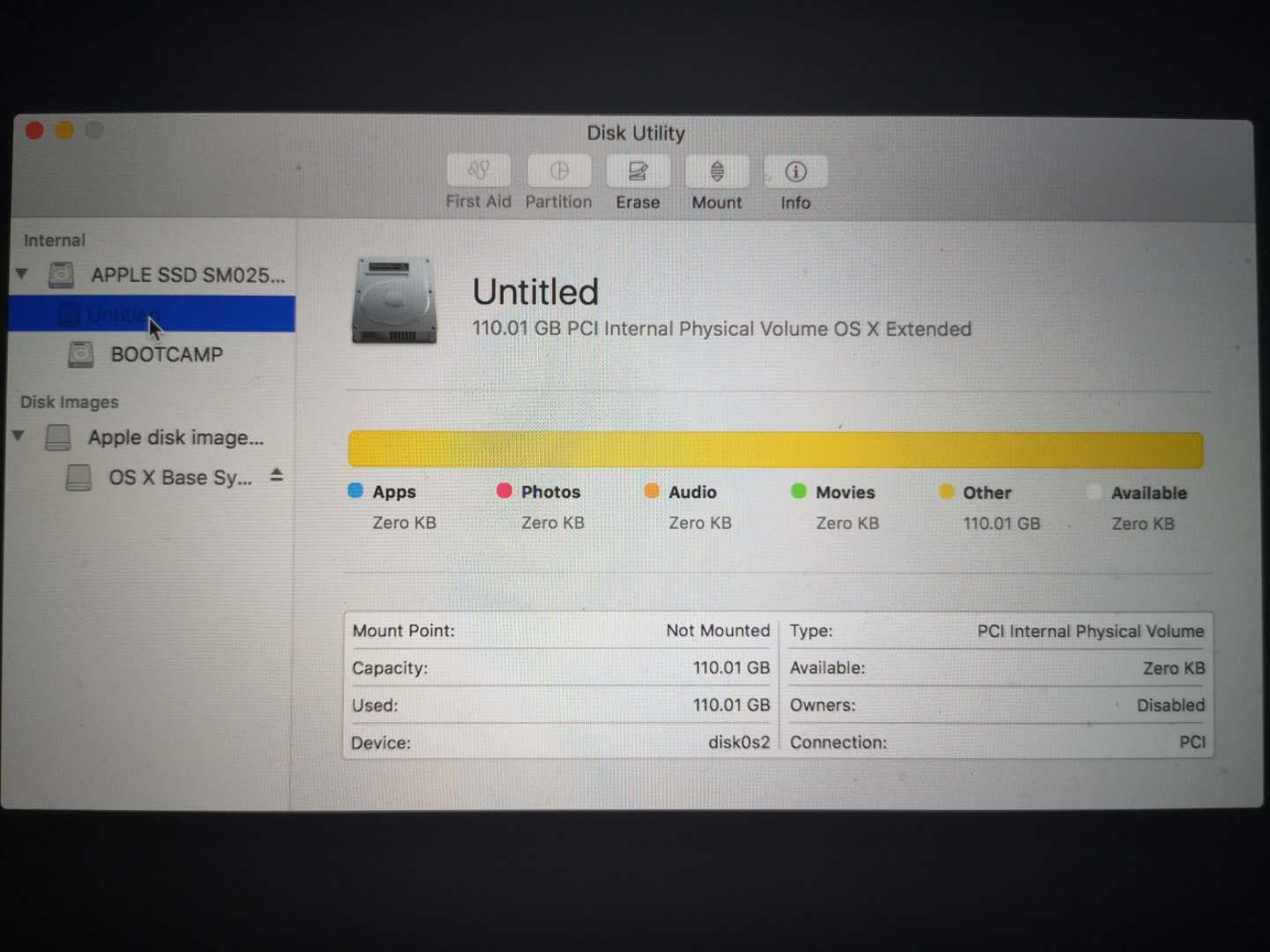While installing Ubuntu on my MacBook Pro 2015, which already has Windows and macOS installed, I made a huge mistake by selecting the "install alongside Windows" option. As a result, I can no longer boot into macOS or Windows.
With the successfully installed Ubuntu, I can still see and edit my files from the Windows partition, but not the Mac partition (in fact, it now shows as a "110 GB volume", see the image below) which contains the most important files for me.
Since I stupidly did not make any backups, rebooting into macOS or somehow extract the files in this particular partition is now my top priority.
Here are what I have tried.
First, upon inputing the command diskutil list in terminal under internet recovery mode, I discovered that the partition type for my disk0s1 had turned into FFFFFFFF-FFFF-FFFF-FFFF-FFFFFFFFFFFF.
Then I followed @klanomath's instructions on Data Not Backed Up, Partition Type: FFFFFFFF-FFFF-FFFF-FFFF-FFFFFFFFFFFF to cope with the problem, but wasn't successful.
here is what was returned after inputing dd if=/dev/disk0s2 count=3 | vis -c:
3+0 records in
3+0 records out
1536 bytes transferred in 0.000877 secs (1751142 bytes/sec)
l\M-Cr\M-;O
L\^U\^A\0\0\0\0\0\0\0006\M-_N\0\0...
so I thought this should be from a standard OS X partition, and edited the parition type of disk0s2 accordingly. Meanwhile, I also fixed the MBR problem according to @klanomath's instructions from How to fix broken GPT, GUID and unmountable, no type volumes?.
After all these, the command diskutil list returns:
/dev/disk0 (internal, physical):
#: TYPE NAME SIZE IDENTIFIER
0: GUID_partition_scheme *251.0 GB disk0
1: EFI EFI 209.7 MB disk0s1
2: Apple_HFS 110.0 GB disk0s2
3: Microsoft Basic Data BOOTCAMP 123.9 GB disk0s3
4: Windows Recovery 841.0 MB disk0s4
5: Linux Filesystem 16.0 GB disk0s5
/dev/disk1 (disk image):
#: TYPE NAME SIZE IDENTIFIER
0: GUID_partition_scheme +2.1 GB disk1
1: Apple_HFS OS X Base System 2.0 GB disk1s1
...
And the command gpt -r show /dev/disk0 returns:
start size index contents
0 1 PMBR
1 1 Pri GPT header
2 32 Pri GPT table
34 6
40 409600 1 GPT part - C12A7328-F81F-11D2-BA4B-00A0C93EC93B
409640 214860792 2 GPT part - 48465300-0000-11AA-AA11-00306543ECAC
215270432 992
215271424 31254528 5 GPT part - 0FC63DAF-8483-4772-8E79-3D69D8477DE4
246525952 242062900 3 GPT part - EBD0A0A2-B9E5-4433-87C0-68B6B72699C7
488588852 460
488589312 1642496 4 GPT part - DE94BBA4-06D1-4D40-A16A-BFD50179D6AC
490231808 2911
490234719 32 Sec GPT table
490234751 1 Sec GPT header
At this point, there still seems to be a problem with disk0s2, as its type name is "Apple_HFS". This was further supported by what was return after inouting diskutil verifyDisk disk0:
Started partition map verification on disk0
Checking prerequisites
Checking the partition list
Checking for an EFI system partition
Checking the EFI system partition's size
Checking the EFI system partiton's file system
Problems were found with the partition map which might prevent booting
Error: -69766: The partition map needs to be repaired because there's a problemwith the EFI system partition's file system
Underlying error: 8: POSIX reports: Exec format error
Also, an error was raised for diskutil verifyVolume disk0s1:
Started file system verification on disk0s1 EFI
Verifying file system
** /dev/rdisk0s1
** Phase 1 - Preoaring FAT
** Phase 2 - Checking Directorues
** Phase 3 - Checking for Orphan Clusters
Found orphan clusters
206 files, 144089KiB free (288179 clusters)
File system check exit code is 8
Error: -69845: File system verify or repair failed
Underlying error: 8: POSIX reports: Exec format error
And diskutil verifyVolume disk0s2 returns:
Started file system verification on disk0s2
Verifying file system
File system check exit code is 8
Error: -69845: File system verify or repair failed
Underlying error: 8: POSIX reports: Exec format error
Update:
I had been using macOS Catalina.
Below is what was returned for export LC_CTYPE="ASCII"; dd if=/dev/disk0s2 count=1 | vis -cfw:
1+0 records in
1+0 records out
512 byte transferred in 0.001240 secs (412898 bytes/sec)
l\M-Cr\M-;O\nL\^U\^A\0\0\0\0\0\0\0006\M-_N\0\0\0\0\0\^A\0\0\^M@\0\0\0\0NXSB\0\
\^P\0\0\^?\M-P\M^Y\^A\0\0\0\0\0\0\0\0\0\0\0\0\0\0\0\0\0\0\0\0\^B\0\0\0\0\0\0\0\
\M-`"\^X\M^X\M^U\M^QA\M-o\M^X\M-L\^A\M-1:<\t\^_\M-4\M-}.\0\0\0\0\0007\M-_N\0\0\
\0\0\0\^X\^A\0\0\^Xl\0\0\^j\M^O\0\0\0\0\0\0T\^Y\0\0\0\0\0\0\^Z\0\0\0\M-o\^T\0\
\0\^X\0\0\0\^B\0\0\0\M-\\^T\0\0\^S\0\0\0\M-H\M-{.\0\0\0\0\0Ug\^F\0\0\0\0\0\^A\
\^D\0\0\0\0\0\0\0\0\0\0d\0\0\0\^C\^D\0\0\0\0\0\0\M-%7\^A\0\0\0\0\0\M-'7\^A\0\0\
\0\0\0\M-9\M-V\^A\0\0\0\0\0\0\0\0\0\0\0\0\0\0\0\0\0\0\0\0\0\0\0\0\0\0\0\0\0\0\
\0\0\0\0\0\0\0\0\0\0\0\0\0\0\0\0\0\0\0\0\0\0\0\0\0\0\0\0\0\0\0\0\0\0\0\0\0\0\0\
\0\0\0\0\0\0\0\0\0\0\0\0\0\0\0\0\0\0\0\0\0\0\0\0\0\0\0\0\0\0\0\0\0\0\0\0\0\0\0\
\0\0\0\0\0\0\0\0\0\0\0\0\0\0\0\0\0\0\0\0\0\0\0\0\0\0\0\0\0\0\0\0\0\0\0\0\0\0\0\
\0\0\0\0\0\0\0\0\0\0\0\0\0\0\0\0\0\0\0\0\0\0\0\0\0\0\0\0\0\0\0\0\0\0\0\0\0\0\0\
\0\0\0\0\0\0\0\0\0\0\0\0\0\0\0\0\0\0\0\0\0\0\0\0\0\0\0\0\0\0\0\0\0\0\0\0\0\0\0\
\0\0\0\0\0\0\0\0\0\0\0\0\0\0\0\0\0\0\0\0\0\0\0\0\0\0\0\0\0\0\0\0\0\0\0\0\0\0\0\
\0\0\0\0\0\0\0\0\0\0\0\0\0\0\0\0\0\0\0\0\0\0\0\0\0\0\0\0\0\0\0\0\0\0\0\0\0\
Conclusion:
The problem is now solved. A huge thank you to @David Anderson: Thank you so much for your patient and knowledgable guidance! Also thanks to @grg, who revised this post to make it more clear, and @mbike, who suggested potential alternative solutions to my problem.
Below are what was done to finally solve the problem:
First, I used the following command to correct the type of disk0s2 to 7C3457EF-0000-11AA-AA11-00306543ECAC:
diskutil umountDisk disk0
gpt remove -i 2 disk0
diskutil umountDisk disk0
gpt add -i 2 -b 409640 -s 214860792 -t 7C3457EF-0000-11AA-AA11-00306543ECAC disk0
Meanwhile, since my macOS Recovery is an old 10.11.6 version, diskutil did not recognize APFS. Thus, the type name of disk0s2 under diskutil list shows 7C3457EF-0000-11AA-AA11-00306543ECAC instead.
After shutting done my MacBook and start up again while holding Option-Command-R, a newer version of macOS recovery (10.14) was downloaded. Then, I can see my see the "Macintosh HD" option again, and am able to boot into it.


dd if=/dev/disk0s2 count=3 | vis -cwas not long enough to be useful. Also, you probably should have usedexport LC_CTYPE="ASCII";dd if=/dev/disk0s2 count=3 | vis -cfw.export LC_CTYPE="ASCII";dd if=/dev/disk0s2 count=1 | vis -cfw. You might also consider usinggdiskto sort the GPT entries in ascending order.7C3457EF-0000-11AA-AA11-00306543ECAC. You currently have48465300-0000-11AA-AA11-00306543ECAC. I assume you know how to fix this? If not, post a comment.export LC_CTYPE="ASCII";dd if=/dev/disk0s2 count=1 | vis -cfw.